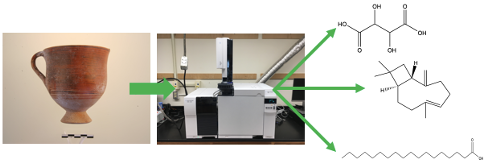Our group is seeking to take part in a new, interdisciplinary field of study known as archaeochemistry, which combines chemical analysis with archaeological investigation. While archaeology and the physical sciences have a history dating back several centuries, recent advances in analytical chemistry have sparked the development of a new subfield known as organic residue analysis (ORA). ORA seeks to answer questions about ancient cultures by extracting and identifying organic compounds related to the original use of an artifact. ORA is most frequently performed on clay pottery vessels, as the porous nature of fired ceramic provides an ideal matrix in which compounds can be absorbed, trapped, and preserved for many thousands of years. Specifically, those vessels used for the preparation, consumption, and storage of food products excel both at trapping resides and at providing relevant anthropological information.
In collaboration with Dr. Aleydis Van de Moortel of UT’s Classics department, our group is investigating the rise and fall of elite prehistoric Greek societies via organic residue analysis of Bronze Age pottery. During the Bronze Age, Greece was dominated by two elite cultures: the Corridor House society in the Early Bronze Age and the Mycenaean Palatial Society in the Late Bronze Age. Due to the lack of written records form this period, there is much that remains unknown about these two civilizations, especially regarding how they rose to and fell from power and the delimiters that designated different social classes. ORA can provide answers to these questions by determining the dietary habits of these cultures, as different types of food and drink are frequently used as social status markers. At the same time, we endeavor to improve the current methodology in this developing field, in order to optimize and standardize organic residue analyses across the board. We are coordinating with several archaeological excavations in central Greece to collect a large number of pottery samples for analysis. These samples will be analyzed via a variety of chromatographic and mass spectrometric methods, including GC/MS, LC/MS, and LC/MS/MS.
